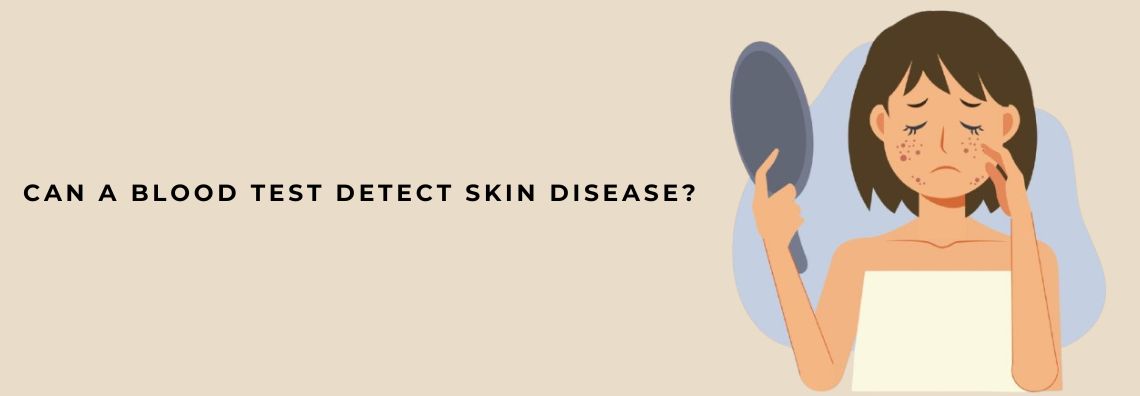
When you consider skin disease, a blood test likely does not leap to mind. I mean, skin issues manifest on the surface—rashes, redness, dryness, or bumps. So, you might wonder: Can a blood test indeed identify skin diseases?
The short answer is: not directly—but sometimes it can be useful. Blood tests will not usually diagnose skin conditions on their own, but they can provide useful information about what’s happening inside your body. They usually verify the diagnosis of skin illnesses or eliminate underlying health issues that may cause your skin to react a particular way.
Let’s dissect this and see when and how blood testing occurs in skin medical care.
When Blood Tests Assist in the Diagnosis of Skin
Your skin is your largest organ, and its condition reflects your immune system, endocrine balance, nutrition, and internal organs. Blood tests (and skin cancer screening) offer valuable insights into these aspects.
They help in the following ways:
1. Detection of Infection
If your skin looks infected—red, swollen, pusy, or hot—your doctor might request a complete blood count (CBC). This test checks your white blood cell level. When your white blood cell level is elevated, it can be a sign that your body is fighting an infection.
For infections caused by bacteria, it can be used to justify the prescription of antibiotics. For certain serious skin infections such as cellulitis, blood cultures can also be performed to determine whether the bacteria have broken into the bloodstream.
2. Autoimmune Disease Screening
Some skin diseases involve the immune system attacking your body by mistake. These are referred to as autoimmune diseases, and blood screening is usually a necessary component of their diagnosis.
Examples are:
- Lupus: A condition that causes a butterfly-shaped rash on the face, as well as joint pain and fatigue. The diagnosis is made by blood tests such as the ANA (antinuclear antibody) test.
- Psoriasis and psoriatic arthritis: Though seen primarily from the look of the skin, blood tests may identify inflammatory markers such as C-reactive protein (CRP) or ESR.
- Dermatomyositis: Less common disease with muscle weakness and skin rashes. Muscle enzymes and autoantibodies can be detected through blood tests.
3.Diagnosis of Allergic Reactions
Rashes, hives, or eczema may at times be caused by allergies, rashes, or eczema. Though skin tests are trendy, laboratory tests such as IgE (Immunoglobulin E) in blood can also be used to detect allergies to food, pollen, dust, or anything else.
It will assist your physician in determining if your skin reaction is a result of an immune reaction, and what to keep away from.
4. Assessing Hormonal Imbalances
Your hormones play a bigger role in your skin than you may realize. Acne, hair loss, or hirsutism (excessive hair) can be caused by hormonal imbalance. For women, PCOS (Polycystic Ovary Syndrome) commonly leads to acne and facial hair in women because of elevated androgen (male hormone) levels.
A blood test may measure:
- Testosterone levels
- Estrogen and progesterone
- Thyroid hormones (e.g., TSH, T3, T4)
If your skin issues result from a hormonal imbalance, blood tests are of prime significance in diagnosing and treating the condition.
5. Vitamin and Nutrient Deficiencies
Sometimes, problems of the skin are the direct outcome of what your body is short of. Blood tests will reveal:
- Low iron (may cause pale complexion or baldness)
- Vitamin B12 deficiency (associated with hyperpigmentation)
- Vitamin D deficiency (associated with dryness of the skin and eczema)
- Zinc deficiency (may cause delayed healing of rash or wound)
These imbalances are normally able to do a great deal to help your skin health.
When Blood Tests Aren’t Enough
Although blood testing is helpful, it’s often only part of the picture. Skin disorders in most cases are still diagnosed on physical examination, history, and occasionally a biopsy or skin swab.
These are a few examples where blood testing isn’t that helpful by itself:
- Eczema: Mostly. Diagnosed by eye and symptoms.
- Fungal infections: Such as ringworm or athlete’s foot—diagnosed by skin scrapings or culture.
- Skin cancer: Needs to be biopsied to be sure of it; blood tests can’t diagnose melanoma or other cancers by themselves.
- Acne: Typically evaluated visually, although hormone testing may be beneficial in certain cases.
So, When Should You Get a Blood Test for a Skin Issue?
There are some clues that blood tests may be beneficial:
- You keep getting rashes with no explanation.
- Your skin symptoms accompany fatigue, joint pain, or fever.
- You suspect an environmental or food allergy.
- You suddenly get acne, hair loss, or menstrual disturbances.
- You’re not recovering from usual treatments of the skin.
In such cases, a blood test can reveal what’s going on beneath your skin and guide your treatment.
Final Thoughts
Although a blood test can’t examine your skin directly, it is able to illuminate underlying issues that impact your skin’s wellness. Compare it to an investigator at an agency—combined with your physician’s data, your history, and other exams to uncover the cause of your skin concern.
If you’re having trouble with skin issues that aren’t getting better, don’t be afraid to ask your physician about blood tests. They’re a harmless, easy way to get valuable information—and sometimes a step toward clearer answers and healthier skin.